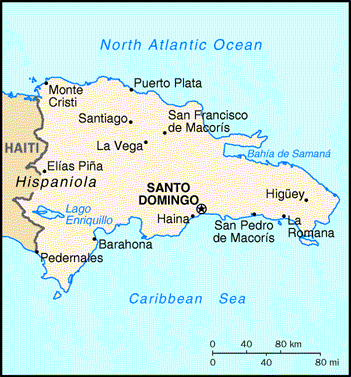

Status Quo Side: Military junta
Non-Status Quo Side: Bosch and PRD
Region: Western Hemisphere
Conflict Type: External Intervention
Issues in Dispute: Governance
Juan Bosch's presidential victory in December 1962 sparked local commercial-military alarm at his alleged pro-Communism, and at the new Constitution of April 1963. On September 1 1963 a military coup installed a Triumvirate that was eventually led by Gen. Donald Reid Cabral with US support.
The replacement of Bosch's elected goverment prompted young military officers to rally to Bosch's PRD party. In late 1964, in the Rio Piedras Pact, they vowed to restore the constitutional President.
The rebellion against the military junta began prematurely, but military professionals in the leadership refused to engage the rebels. Street crowds, hailing Reid's decision to step down, overwhelmed the police. When the installation of a provisional President was broken up by junta-inspired air raids, the populace was inflamed. The US, fearing a Communist Cuban-style take-over, landed Marines on April 28 ostensibly to protect American lives, later supporting Gen.Antonio Imbert Barreras as provisional President. OAS, UN, US and Red Cross mediation efforts alternated with periods of heavy fighting. Finally, the OAS-sponsored peacekeeping force, IAPF, became effective and won popular support. Hector Garcia Godoy was accepted conditionally by both sides as provisional President, but substantial US pressure was required to persuade Imbert to retire.
The Act of Reconciliation led to a general amnesty and Garcia's installation on September 3.
Newly-elected President Joaquin Balaguer took office, and IAPF withdrawal began.
Despite continued, though gradually decreasing, political instability marked by threats of military coups, acts of terrorism and mass demonstrations, President Balguer was reelected in 1970 and 1974, defeated in 1978, reelected although blind in 1986 and again in 1990 in a close election that required a recount, and finally replaced in May 1996.